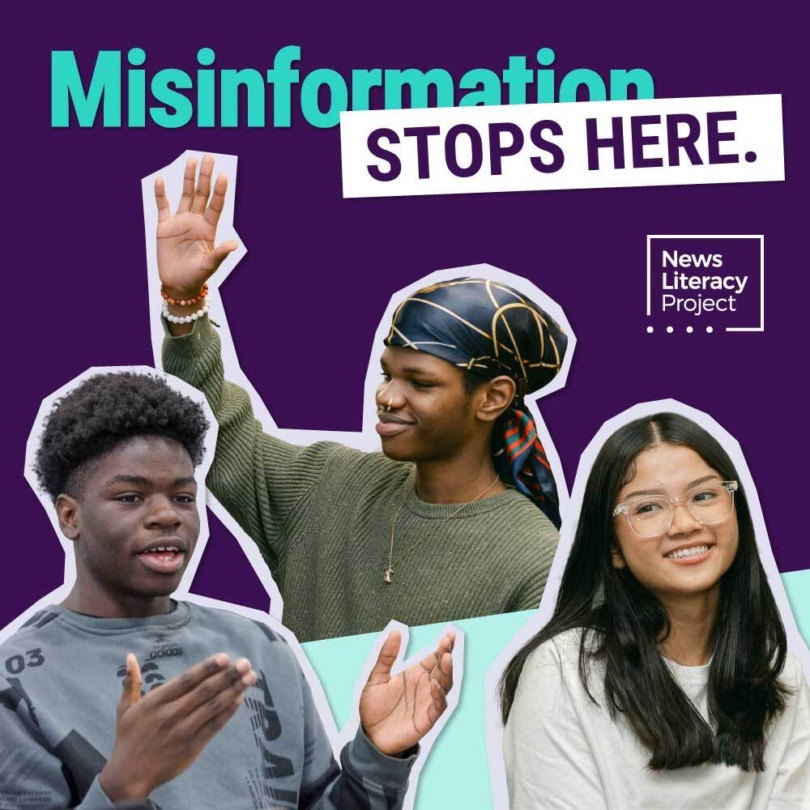
Vetting election information: Tips for veterans, service members
Mis- and disinformation spread in politically charged times, particularly during election campaign season. Military service members, veterans and their families are often targeted by purveyors of disinformation seeking to undermine trust in the voting process.
To break through a confusing and misleading information landscape, the News Literacy Project hosted a panel of experts who work with the military community to discuss common types of election-related misinformation and practical tips for finding reliable news before voting. Zack Baddorf, Navy veteran, journalist and co-founder of Military Veterans in Journalism, moderated the conversation.
📣 Learn the messaging
Ahead of elections, foreign adversaries and domestic actors might aim to influence voters by emphasizing political friction and distrust in the voting process, said Richard Brookshire, CEO and co-founder of the Black Veterans Project. Propagandists seek to influence votes by exacerbating apathy or polarization. “They look at…points of conflict as cracks in the foundation,” added Joe Plenzler, a Marine Corps veteran and board member for We the Veterans and Military Families. “And they just need to pour their narrative like water into these cracks and wait for it to freeze and expand and burst.” Specifically, this might look like messages of moral or economic decline, competition and resource scarcity, Plenzler said.
“What we’re seeing is election integrity messaging and leaning into that in a way to chip away at voter confidence and to make you question whether or not it’s even worth coming out to vote.”
— Richard Brookshire
🧠 Engage with your emotions
Manipulative messages often spark a strong emotional reaction like fear or anger. To avoid being influenced by misinformation, Plenzler suggested the practice of identifying your emotions. When you feel fear, say what you’re feeling to re-engage your brain, Plenzler said. Dissect the message by asking, “To whose advantage is my fear?” he said. Where is the information coming from, and what is the information source trying to get you to do? Don’t underestimate the power of pausing to take a few deep breaths.
“The main takeaway and how you subvert that is through emotional intelligence because the opposite of fear in this situation is not courage… It’s skepticism. It’s asking very hard, pointed questions and being curious about the world.”
— Joe Plenzler
🗳️ Military votes count
Absentee ballots, when filled out correctly, are always counted in every election, regardless of how close the race is. They hold the same weight as a vote cast at a polling place, said Scott Wiedmann, director of the Federal Voting Assistance Program. If you are submitting an absentee ballot, don’t forget to sign your ballot package and send it back as early as possible. If you have questions about registering to vote absentee or finding accurate voting information, Wiedmann points to your unit’s voting assistance officer.
“Every absentee ballot that’s sent in to the election official,
that’s filled out properly and is received on time,
is counted in the election.”
— Scott Wiedmann
📰 Vet your news
If misinformation exists, when can you trust what you read? Nikki Wentling, who covers disinformation and extremism for Military Times, recommends looking for transparency behind the news organization. You should be able to find information about its ownership and funding and look for ethical guidelines published on its site. Credible news outlets also take responsibility for errors, so an outlet that publishes explanations of mistakes and corrections is a good sign, Wentling said.
“Do a quick search of who owns the publication you’re reading or the news channel you’re watching, because reputable news outlets will be transparent about who owns and funds them.”
— Nikki Wentling
For more ways to find credible election news, check out our elections resource hub.



